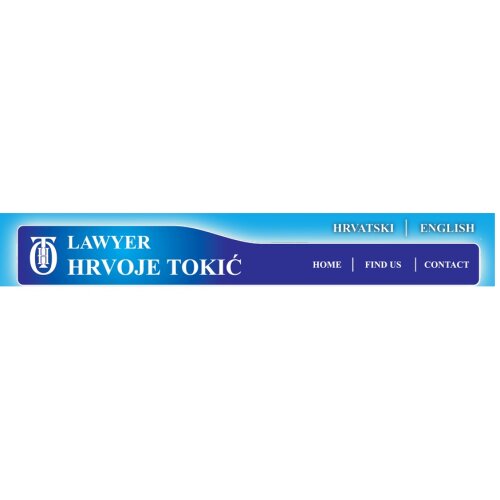Best Employer Lawyers in Croatia
Share your needs with us, get contacted by law firms.
Free. Takes 2 min.
Or refine your search by selecting a city:
List of the best lawyers in Croatia
About Employer Law in Croatia
The landscape of employment law in Croatia is primarily governed by the Labour Act, which establishes the legal framework for employment relationships. Croatian employer law covers a wide range of topics, including employment contracts, working conditions, workers' rights, health and safety regulations, and termination procedures. Employers must comply with both national legislation and European Union directives, as Croatia is a member of the EU. The law aims to balance the interests of employers and employees, ensuring fair treatment and preventing discrimination in the workplace.
Why You May Need a Lawyer
There are several situations where seeking legal advice from a lawyer specializing in employer law could be beneficial for both employers and employees:
- Drafting or reviewing contracts: Legal assistance can ensure that employment contracts comply with Croatian law and adequately protect your interests.
- Workplace disputes: Lawyers can help mediate conflicts or represent your interests in legal proceedings related to discrimination, harassment, or wrongful termination.
- Compliance issues: Employers may need guidance to ensure that their policies and practices conform with the latest legal requirements.
- Redundancies and layoffs: Legal counsel can provide guidance on fair procedures and severance entitlements.
- Health and safety issues: Navigating the complexities of occupational health and safety regulations may necessitate expert advice.
Local Laws Overview
Key aspects of employer-related local laws in Croatia include:
- Employment Contracts: Must be in writing and include essential information such as job description, working hours, salary, and duration (if applicable).
- Working Hours and Overtime: Standard working hours are limited to 40 hours per week, with overtime restricted by law and subject to additional pay.
- Minimum Wage: There is a statutory minimum wage which must be adhered to by all employers.
- Non-Discrimination: Employers must provide equal treatment regardless of race, gender, age, disability, sexual orientation, or religion.
- Termination of Employment: Specific procedures and notice periods must be followed, and employees may be entitled to severance pay.
- Occupational Health and Safety: Employers are required to provide a safe working environment and comply with health and safety laws.
Frequently Asked Questions
Are employment contracts mandatory in Croatia?
Yes, employment contracts are mandatory and must be in written form. They need to specify critical employment details to ensure clarity and compliance with the Labour Act.
What are the legal requirements for overtime pay?
Overtime work must be compensated at a rate higher than regular pay. The Labour Act outlines the specifics, usually requiring at least a 50% premium over the usual hourly rate.
How is termination of employment regulated in Croatia?
Terminating employment requires adherence to legal procedures, including providing a valid reason, notice periods, and potentially severance pay, particularly for permanent employees.
What rights do employees have regarding annual leave?
Employees in Croatia are entitled to a minimum of four weeks of paid annual leave, which may be more if specified in the employment contract or collective agreement.
How does the law address workplace discrimination?
Croatian law prohibits discrimination based on personal characteristics like race, gender, or age, both in hiring processes and within the workplace environment.
What is the process for resolving workplace disputes?
Disputes can be addressed through internal company mechanisms, mediation, or legal proceedings before labor courts, with a priority on legal compliance and fair treatment.
Do employees have the right to strike?
Yes, employees have the right to strike, but this must be carried out according to legal procedures, particularly concerning essential public services.
Are there specific health and safety requirements for employers?
Employers must adhere to stringent health and safety guidelines to mitigate risks and eliminate workplace hazards as set out by national and EU regulations.
What are the rules regarding probationary periods?
The probationary period, if included in the employment contract, may not exceed six months and must be clearly defined at the outset of employment.
How does the law regulate work during weekends and public holidays?
Work performed during weekends and public holidays is subject to additional compensation as per legal stipulations to safeguard workers' rights to rest.
Additional Resources
For further assistance, consider reaching out to the following resources:
- Ministry of Labour, Pension System, Family and Social Policy: The national body responsible for labor regulations and policy implementation.
- The Croatian Chamber of Commerce: Provides guidance and support to employers regarding compliance and best practices.
- Trade Unions: Offering legal advice and support to employees on employment matters.
- Employment Service: Provides resources and support for labor market participants.
Next Steps
If you find yourself in need of legal assistance regarding employment matters in Croatia, consider the following steps:
- Identify Your Needs: Clearly define your legal issue or concerns to better communicate them to a legal professional.
- Seek Expert Legal Advice: Engage a lawyer specializing in Croatian employment law for personalized guidance.
- Prepare Necessary Documentation: Gather relevant contracts, correspondence, and any other pertinent materials to facilitate an advisory session.
- Consider Mediation: If feasible, explore the option of mediating disputes as a time- and cost-effective resolution method.
- Know Your Rights: Educate yourself on your legal rights and obligations under Croatian labor law to make informed decisions.
Lawzana helps you find the best lawyers and law firms in Croatia through a curated and pre-screened list of qualified legal professionals. Our platform offers rankings and detailed profiles of attorneys and law firms, allowing you to compare based on practice areas, including Employer, experience, and client feedback.
Each profile includes a description of the firm's areas of practice, client reviews, team members and partners, year of establishment, spoken languages, office locations, contact information, social media presence, and any published articles or resources. Most firms on our platform speak English and are experienced in both local and international legal matters.
Get a quote from top-rated law firms in Croatia — quickly, securely, and without unnecessary hassle.
Disclaimer:
The information provided on this page is for general informational purposes only and does not constitute legal advice. While we strive to ensure the accuracy and relevance of the content, legal information may change over time, and interpretations of the law can vary. You should always consult with a qualified legal professional for advice specific to your situation.
We disclaim all liability for actions taken or not taken based on the content of this page. If you believe any information is incorrect or outdated, please contact us, and we will review and update it where appropriate.
Browse employer law firms by city in Croatia
Refine your search by selecting a city.

















